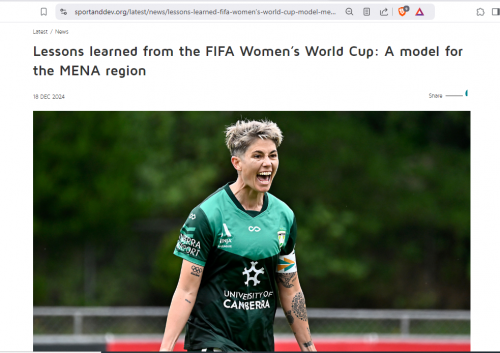
https://www.sportanddev.org/latest/news/lessons-learned-fifa-women%E2%80...
The Transformative Power of Athlete Advocacy
One of the standout initiatives during the Women’s World Cup was FIFA’s “Football Unites the World” campaign, in collaboration with United Nations agencies and the World Health Organization (WHO). This campaign introduced eight themed armbands, each highlighting a critical global issue such as inclusion, gender equality, peace, and ending violence against women.
While seemingly simple, the armbands became a platform for athletes to amplify causes they care about, sparking conversations across local and global audiences. Australia’s unique response to this global initiative underscored how sports can inspire action on the ground.
Optus Sport Interview with Jamal Elsheikh. Watch on YouTube
Australia’s Anti-Racism Armband: A Playbook for Change
In partnership with Reflect Forward, an anti-racism education movement, Professional Footballers Australia (PFA) launched the first anti-racism armband during the Australian League season. Worn by captains like Michelle Heyman and Cass Davis, the armband symbolized unity and resilience, but its impact went far deeper than symbolism.
Educational programs were paired with the initiative to ensure long-term change. From school lesson plans that empowered students to tackle racism to video series where players shared their personal stories, the armband became a catalyst for courageous conversations across communities.
This approach—integrating advocacy with education—offers a powerful lesson for the MENA region, where sports hold the potential to address challenges like social cohesion, gender inequality, and peacebuilding.
What Can the MENA Region Learn?
Sudan, for example, stands at a crossroads. As the country seeks to qualify for the 2026 FIFA World Cup, football could play a transformative role in promoting peace and resilience. A Sudanese-led “Unite for Peace” armband, inspired by the Women’s World Cup and Reflect Forward, could serve as a unifying symbol in a nation divided by conflict.
This initiative could be paired with grassroots education campaigns to amplify its impact. Sudanese athletes, as role models, have the power to inspire communities, reshape narratives, and foster reconciliation—critical steps toward achieving the United Nations Sustainable Development Goal 16: Peace, Justice, and Strong Institutions.
A Regional Vision for Sport and Peace
The lessons from the Women’s World Cup and Reflect Forward demonstrate that sport, when paired with strategic advocacy and education, can catalyze sustainable change. In the MENA region, where sports are already deeply woven into the cultural fabric, initiatives like athlete-led armbands can become powerful tools for development and peace.
Whether it’s advancing gender equality, combating racism, or fostering social cohesion, the potential for sports to contribute to the Sustainable Development Goals (SDGs) is immense. The challenge lies in adapting these lessons to local contexts and empowering athletes and communities to take the lead.
Conclusion
As the world looks to sports as a driver of development and peace, the MENA region has a unique opportunity to lead the way. By building on successful models like the FIFA Women’s World Cup and Reflect Forward, countries can harness the unifying power of football to inspire change, promote peace, and achieve the SDGs. Football isn’t just a game; it’s a global language that can unite us all. Now is the time to leverage that power.
About the author
A. Jamal Elsheikh, a Sudanese-Australian social innovator, is the co-founder of Reflect Forward, an education movement tackling racism, and #Platform249, an initiative leveraging sports for peace in Sudan. Recognized globally for his work in using sports to inspire change, Jamal was a 2024 Australian of the Year finalist in the Local Hero category. His insights are shaped by his recent Churchill Global Fellowship, which took him to 16 countries to study best practices in community development through sports.









